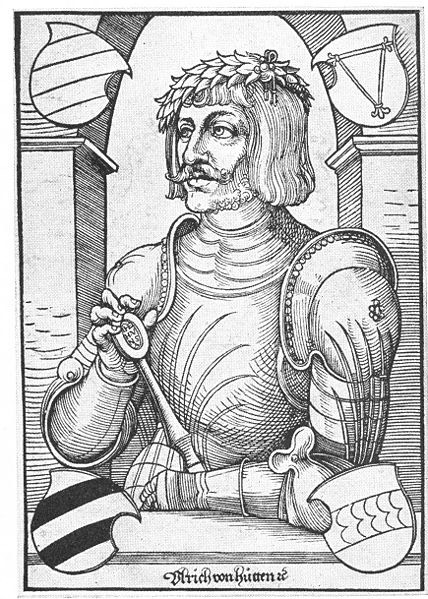March 15th, 2012
The life of Ulrich von Hütten was a Greek tragedy. He was brilliant and immensely energetic; he was an accomplished scholar who wrote books and pamphlets; he founded his own publishing house; and he was the leader of the Imperial Knights of the Holy Roman Empire. But he was hot-headed and that, in the end, led to his ruin.
He started off well, traveling Europe and becoming a master of the new learning now called humanism. He became a top-notch Latin stylist – he could write elegant and vivid Latin prose. I know this sounds odd today, but this kind of learning was really hot back in those days. You see, printing presses had spread all over Europe by this time, and they were churning out tens to hundreds of thousands of books. The price of books plummeted, coming within reach of the middle classes, and people were taking to books the way people took to computers over the last 30 years. The demand for “software” for the books – content other than the Bible – was exploding, and anybody who could write well became an instant media star. In fact, Erasmus of Rotterdam became the first media superstar: after his book The Praise of Folly became a smash hit, people bought books primarily because of his authorship. Nothing like this had ever happened before.
Ulrich von Hütten hit the top ten with Letters of Obscure Men, a satire on the anti-humanist forces. You see, one of the popular books at the time was Letters of Brilliant Men, published by Johann Reuchlin. The story of this book is complicated. The major controversy of the day was between humanist scholars and conservative monks. The scholars celebrated the edifying value of classical literature (writings by Romans and Greeks); the monks’ attitude was “We don’t need no stinkin’ Greeks and Romans – all we need is the Bible”. Reuchlin had published Letters of Brilliant Men to support the humanist cause; it showed that all the smart people favored humanism. Von Hütten took the opposite tack with Letters of Obscure Men: it was a collection of fictitious letters supposedly presenting the monks’ side of the argument – except that it was chock full of idiocies, superstition, and vainglory. The work was sly enough that the monks were at first fooled by it, but the rest of Europe caught onto the satire immediately and soon everybody was laughing at the monks. Von Hütten didn’t write the entire book; several others collaborated. But he was the driving force behind the book, and was celebrated for it.
Two events, however, put him on the road to ruin. A visit to Rome opened his eyes to the venality and corruption of the Catholic Church; he could see with his own eyes how the Pope and the cardinals lived in opulence inconsistent with the ideals of Christianity. This turned him against the Church and led him to join forces with Luther later.
The second turning point in his life came when the Duke of Württemberg murdered Ulrich’s relative Hans von Hütten. The Duke of Württemberg was a powerful man and no justice could be obtained against him, so Ulrich von Hütten used the only weapon he had: his biting satire. He published a series of pamphlets ridiculing and vituperating the Duke. Although the Holy Roman Emperor protected Ulrich von Hütten from retaliation, his vicious attacks did not enhance his reputation.
Matters came to a head when von Hütten helped organize a group of knights to attack the lands of the Archbishop of Trier, a strong opponent of the humanists. The politics of all this were complicated, but basically, they failed. Von Hütten lost everything and fled to Switzerland, outside the reach of the Holy Roman Empire. He tried to meet with Erasmus in Basel, but Erasmus, adamantly opposed to violence, refused to see him. Von Hütten fled to a little monastery (ironically enough) on an island in a Swiss lake, where he died of the syphilis that had been eating at him for years.
